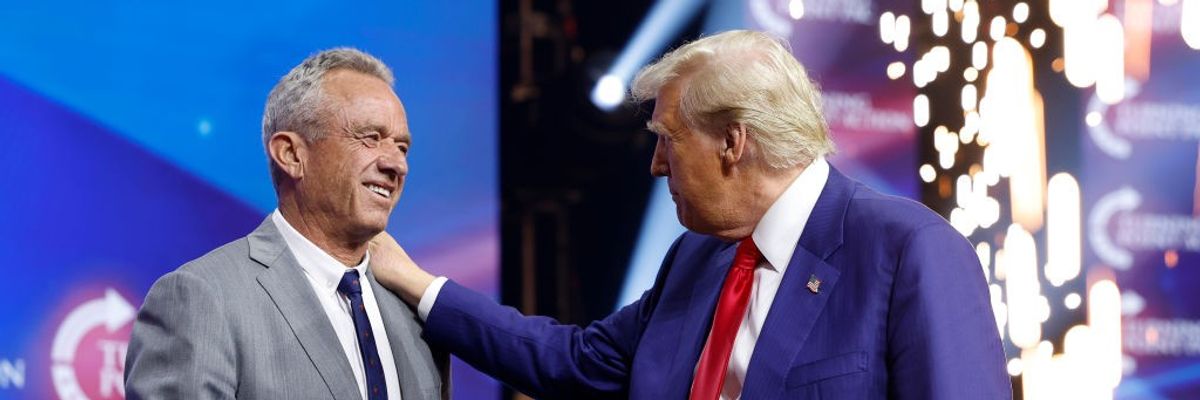Public health advocates, federal lawmakers, and other critics responded with alarm to The New York Timesreporting on Friday that an attorney helping Robert F. Kennedy Jr. select officials for the next Trump administration tried to get the U.S. regulators to revoke approval of the polio vaccine in 2022.
"The United States has been a leader in the global fight to eradicate polio, which is poised to become only the second disease in history to be eliminated from the face of the earth after smallpox," said Liza Barrie, Public Citizen's campaign director for global vaccines access. "Undermining polio vaccination efforts now risks reversing decades of progress and unraveling one of the greatest public health achievements of all time."
Public Citizen is among various organizations that have criticized President-elect Donald Trump's choice of Kennedy to lead the Department of Health and Human Services, with the watchdog's co-president, Robert Weissman, saying that "he shouldn't be allowed in the building... let alone be placed in charge of the nation's public health agency."
Although Kennedy's nomination requires Senate confirmation, he is already speaking with candidates for top health positions, with help from Aaron Siri, an attorney who represented RFK Jr. during his own presidential campaign, the Times reported. Siri also represents the Informed Consent Action Network (ICAN) in petitions asking the Food and Drug Administration (FDA) "to withdraw or suspend approval of vaccines not only for polio, but also for hepatitis B."
According to the newspaper:
Mr. Siri is also representing ICAN in petitioning the FDA to "pause distribution" of 13 other vaccines, including combination products that cover tetanus, diphtheria, polio, and hepatitis A, until their makers disclose details about aluminum, an ingredient researchers have associated with a small increase in asthma cases.
Mr. Siri declined to be interviewed, but said all of his petitions were filed on behalf of clients. Katie Miller, a spokeswoman for Mr. Kennedy, said Mr. Siri has been advising Mr. Kennedy but has not discussed his petitions with any of the health nominees. She added, "Mr. Kennedy has long said that he wants transparency in vaccines and to give people choice."
After the article was published, Siri called it a "typical NYT hit piece plainly written by those lacking basic reading and thinking skills," and posted a series of responses on social media. He wrote in part that "ICAN's petition to the FDA seeks to revoke a particular polio vaccine, IPOL, and only for infants and children and only until a proper trial is conducted, because IPOL was licensed in 1990 by Sanofi based on pediatric trials that, according to FDA, reviewed safety for only three days after injection."
The Times pointed out that experts consider placebo-controlled trials that would deny some children polio shots unethical, because "you're substituting a theoretical risk for a real risk," as Dr. Paul A. Offit, a vaccine expert at the Children's Hospital of Philadelphia, explained. "The real risks are the diseases."
Ayman Chit, head of vaccines for North America at Sanofi, told the newspaper that development of the vaccine began in 1977, over 280 million people worldwide have received it, and there have been more than 300 studies, some with up to six months of follow-up.
Trump, who is less than six weeks out from returning to office, has sent mixed messages on vaccines in recent interviews.
Asked about RFK Jr.'s anti-vaccine record during a Time "Person of the Year" interview published Thursday, the president-elect said that "we're going to be able to do very serious testing" and certain vaccines could be made unavailable "if I think it's dangerous."
Trump toldNBC News last weekend: "Hey, look, I'm not against vaccines. The polio vaccine is the greatest thing. If somebody told me to get rid of the polio vaccine, they're going to have to work real hard to convince me. I think vaccines are—certain vaccines—are incredible. But maybe some aren't. And if they aren't, we have to find out."
Both comments generated concern—like the Friday reporting in the Times, which University of Alabama law professor and MSNBC columnist Joyce White Vance called "absolutely terrifying."
She was far from alone. HuffPost senior front page editor Philip Lewis said that "this is just so dangerous and ridiculous" while Zeteo founder Mehdi Hasan declared, "We are so—and I use this word advisedly—fucked."
Ryan Cooper, managing editor at The American Prospect, warned that "they want your kids dead."
Author and musician Mikel Jollett similarly said, "So if you're wondering if Donald Trump is trying to kill your kids, yes, yes he is."
Multiple critics altered Trump's campaign slogan to "Make Polio Great Again."
U.S. Sen. Elizabeth Warren (D-Mass.) responded with a video on social media:
Without naming anyone, Senate Minority Leader Mitch McConnell (R-Ky.), a polio survivor, put out a lengthy statement on Friday.
"The polio vaccine has saved millions of lives and held out the promise of eradicating a terrible disease. Efforts to undermine public confidence in proven cures are not just uninformed—they're dangerous," he said in part. "Anyone seeking the Senate's consent to serve in the incoming administration would do well to steer clear of even the appearance of association with such efforts."

